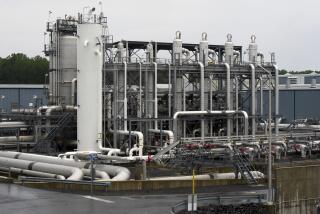Energy Transfer Partners resumes construction on Dakota Access pipeline, at Trump’s urging
- Share via
Construction resumes on Dakota Access pipeline
Construction on the Dakota Access oil pipeline resumed early Thursday, less than 24 hours after the government granted a final easement allowing for completion of the disputed project.
Despite months of protests led by tribal groups and an expanded environmental review ordered in the final days of the Obama administration, the project is racing ahead at the urging of President Trump.
Four days after he was sworn into office, Trump, who has vowed to expand fossil fuel production and roll back environmental regulations, encouraged the U.S. Army Corps of Engineers to abandon the review ordered under Obama. On Tuesday, the Corps announced that it had done so. The next day, it granted the easement, which allows construction across Corps land and a dammed section of the Missouri River.
The company building the pipeline, Energy Transfer Partners, said late Wednesday that it had “received all federal authorizations necessary to proceed expeditiously to complete construction of the pipeline.” The company, based in Texas, said it expects to have in hand $2.6 billion in loans for the project “within the next several days” and for the pipeline to be operational no later than June.
The $3.8-billion, 1,170-mile pipeline would stretch from western North Dakota to Patoka, Ill.
The project is moving forward despite continued protests and ongoing legal challenges.
The Standing Rock Sioux Tribe, which has led protests against the pipeline, has said it will continue to oppose its completion in court and, if necessary, fight the operation of the pipeline if it is completed. The nearby Cheyenne River Sioux tribe, which has joined the Standing Rock Sioux in legal battles, filed a request in federal court in Washington on Thursday for a restraining order to stop construction.
The main section of the pipeline that remains to be built would be laid beneath the dammed river, just north of the Standing Rock Sioux reservation. The tribe says the pipeline threatens its water supply and sacred sites on what had been its land before the government forced it onto the reservation.
Energy Transfer Partners says the pipeline, which could transport more than 500,000 barrels of oil daily, will be safer than moving oil by rail or truck.
The Standing Rock Sioux have encouraged people who have been protesting the pipeline near its reservation for months to leave and focus instead on political and legal efforts across the country.
Those efforts include divestment. On Tuesday, Seattle became the first city in the nation to end its relationship with a bank in protest of the pipeline. The Seattle City Council voted unanimously to sever ties with Wells Fargo, which manages about $3 billion for the city annually.
Latest updates
More to Read
Get the L.A. Times Politics newsletter
Deeply reported insights into legislation, politics and policy from Sacramento, Washington and beyond. In your inbox three times per week.
You may occasionally receive promotional content from the Los Angeles Times.










